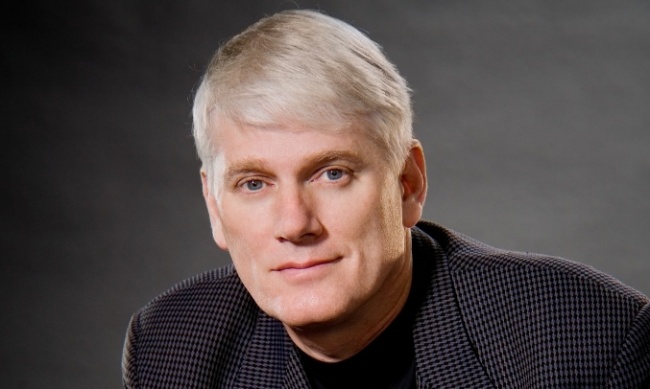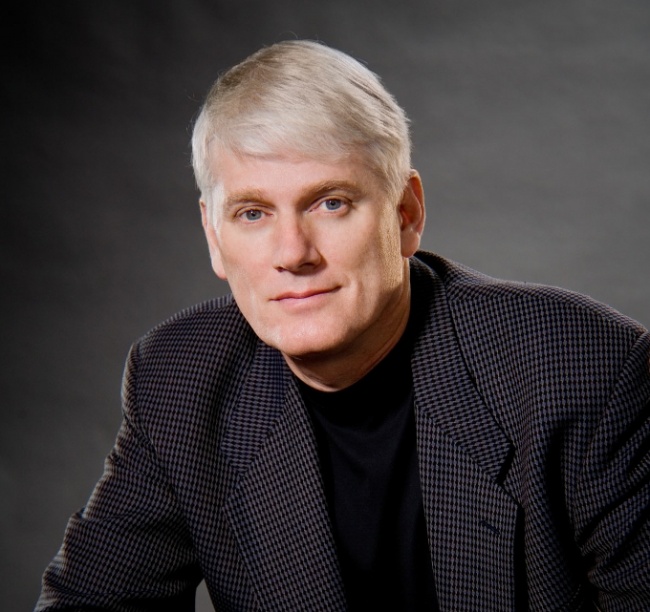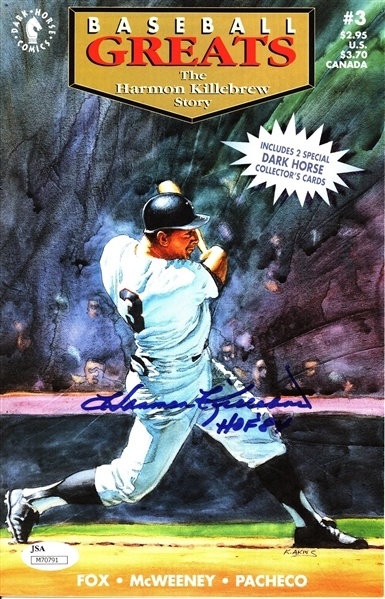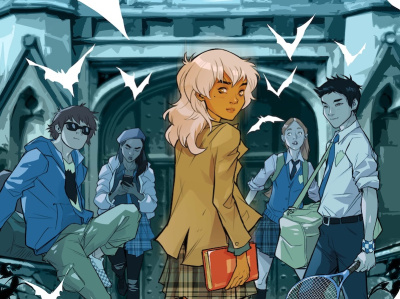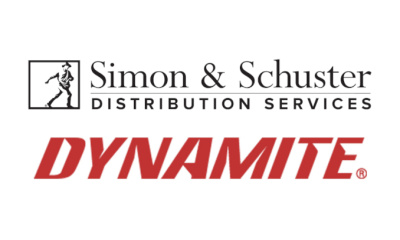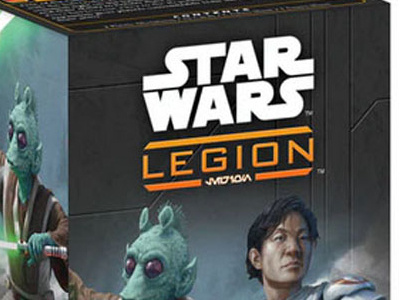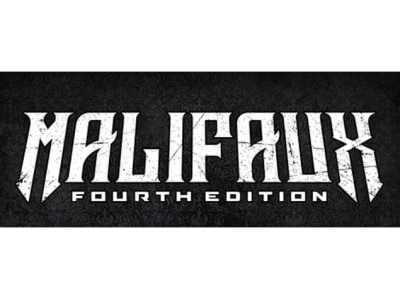Comic retailing led to comic publishing for Mike Richardson. And 30 years later, Dark Horse Comics is still going strong.
Richardson was an art major with a successful commercial art job in 1980 when he decided to open a business. He started a comic shop in Bend, OR, and quickly expanded into a four-store chain. As his reputation grew, he started meeting talent in the business. But something struck him as wrong.
“I’d meet comic artists and writers and I started taking them out to lunch,” Richardson says today. “They started talking about how they didn’t own the things the created, which kind of bothered me.”
Richardson did something about his bother, and launched Dark Horse Comics in 1986. In the years since, Dark Horse has created original properties, revolutionized comic licensing, and been a champion for creator ownership. Richardson has learned much along the way.
THE GOOD
Start Your Own Business
Richardson’s life turned on a dime when he got a gift from his wife. It was a teddy bear with a rose and balloons tied to it. A note said, “You’re going to be a dad.”
“So I walked in and quit my job… which, admittedly, is not what most people would do under the circumstances,” Richardson says. “But I was terrified I was going to get stuck working for someone else forever when my real ambition was to start my own company.”
Richardson’s wife had a job at a bank, and he encouraged her to follow suit.
“I told her, ‘I quit my job today, you quit yours, too. I’m emptying the bank account and opening a comic book shop.’ And she said, ‘Sure, let’s go,’ and it’s all worked out alright.”
Richardson started the store with a credit card with a $2500 limit. Those lunch meetings with talent led to the creation of Dark Horse Comics and its initial offering, Dark Horse Presents #1.
“In San Diego, 1986, we found out it was a hit,” Richardson says. “We had hoped to sell 10,000; we ended up selling 50,000.”
Expand with Name Brands
After some heady success, reality set in.
“The first few years, we received critical praise, but we seemed to have a cap on our sales,” Richardson says. “Most of our books were selling 30,000, which sounds great today, but in those days, there were a lot of books selling 100,000, 200,000 and more.”
Richardson looked around for what to do to expand sales.
“It became apparent that we had a disadvantage,” he says. “Some of the characters from Marvel or DC had been around for decades, and were known to large audiences. So we looked to licensing.”
Richardson and Dark Horse came in with a new spin.
“To our mind, no one was doing licensing right,” he says. “Publishers would usually do adaptations, or monthly stories that really didn’t have much to do with real continuity. We did things that were continuity-based. We thought that if we picked our favorite properties, we could essentially do sequels to films in comic form. So that’s what we did with Aliens, and then Predator, both of which sold hundreds of thousands. Then Aliens vs. Predator sold multiples of that. I think that really launched the model people use to this day for licensed books.”
Make the Right Friends
Richardson believed in creators owning their creations, and in showing open. These philosophies paid off.
“I met Geoff Darrow at a comic con, and he told me he was doing a project with Frank Miller,” Richardson remembers. “I asked if he’d let me have a shot at publishing it. Geoff said he’d call me.”
That call turned out to be revolutionary.
“Geoff said, ‘Frank’s going to be at this place in Los Angeles at noon tomorrow. Can you be there and meet him?’ So we hopped on a plane, flew down, and met up with Frank. He had a pencil and a pad of paper to take notes, but the first thing we did is we just showed him where all the money went. We showed him printing cost, shipping cost, running cost, gross profit per book, all of that. And I just handed him the stack of papers I had with all that info. He put his pencil and paper away and said he’d never seen anyone do that before. He said, ‘Meet me tomorrow here again.’”
In the interim, Miller called Dave Gibbons. The pair were developing Give Me Liberty.
“He told Dave, ‘Somebody just gave me the keys to the kingdom,’” Richardson says. “He talked things over with Dave, Frank came back the next day and we shook hands. We had a deal.”
Pulling Miller and Gibbons, fresh off megahits The Dark Knight Returns and Watchmen, was a huge coup for Dark Horse. Richardson was willing to pay dearly. But he didn’t have to.
“I always have to add that I offered Frank 90% of the profits, and he wouldn’t take it,” Richardson says. “I was desperate to get Frank to come to Dark Horse, so I offered him that much. He said, ‘That’s not fair; you have to make money too.’ He refused.”
To this day, Richardson refuses to give the exact share.
“I’m not going to say what the number was,” he says. “But it worked out.”
THE BAD
Do Your Homework
Dark Horse hit a lot of licensing home runs in its early days. It also whiffed on a key pitch.
“There are books that I’ve blown that I should have looked out for,” Richardson says. “Fox gave me the pilot of X-Files back in the day on a VHS tape and said, ‘Watch this, you’re going to love this.’ They wanted us to do it because we had always had a great relationship with Fox. I set it down, and they kept asking me, ‘Have you seen it? Have you seen it? We want to get this going,’ and I just didn’t have the time.”
Finally on a Friday night, Richardson took the tape home and watched it.
“I thought, ‘Geez, this is great! I gotta have this!’” he recalls. “I called them first thing Monday morning and…they had given it to Topps. I just waited too long.”
Put the Money In and CommitDark Horse also missed on the sports collectibles boom, getting in just when the market was ready to collapse.
“When baseball cards were still going huge, we had a plan to capitalize on that by putting baseball cards in comics. We signed up a bunch of players—Jimmy Piersall, Harmon Killebrew, Bob Gibson. But it took us too long to get around to actually producing it,” Richardson says. “By the time we finally did [in 1992], everybody else had already done similar, and we couldn’t be first to market. We missed the peak.”
Dark Horse did their three books, and sales were poor.
“If you’re going to put money into something and commit to something, you have to do it, and not just go halfway, which is what we did,” Richardson laments today. “We allowed ourselves to get sidetracked on the project.”
Don’t Spread Yourself Thin
Comic stores and a comic publishing company led to serial entrepreneurship for Richardson. He started a construction company and a restaurant… until it all got to be too much.
“I spread myself too thin,” he admits. “I probably shouldn’t have been building those houses. We came out okay, but if you’re going to do something, you should probably do it to the hilt, and that was a business that was on the side for me. The restaurant did well, too, so it isn’t like I had bad experiences, but I probably could have focused those energies more on Dark Horse and built even more here. It’s what I wound up doing anyway. But it took me a while to learn that.”
AND WHAT ELSE?
“When Frank [Miller] came, that kind of opened the floodgates and everybody else started coming, and that kind of set up [creator-owned label] Legend. Creators found out that they could own their own comics. I believe Image was a direct result of Frank coming and having success.”
“In the earliest days, I talked to the Image guys about coming here. I talked to Todd [McFarlane], and later Jim [Lee]. They were both interested, but they wanted a different deal than I could give them, so they went off in a different direction. But a lot of the best creators jumped at that point and offered us books, so we had a great run of books at the time, which really continues today.”
“I was an art major. Business majors are taught that there’s one way to do business and there’s one path to success. They approach problems in a specific way. But art majors tend to think outside the box and solve problems as they come up. Everybody’s going to make mistakes, and I certainly have. But you try not to repeat them. You recover, and move along.”
“I’m not a negative-thinking person when problems come up. I’m positive. I just think on a solution, and start putting all my energy in that direction.”
“Some people start comic companies as fodder for movies and TV. Now maybe I’m the last one who should say this because we’ve had success with The Mask and Barb Wire and other things, but it’s not the reason we do the comics. You have to do great comics, and some will be great movies or TV shows as well. Some will just be great comics, or will be great for other purposes. And all these are good outputs; they’re all fine. Trying to start a comic company just to create movie properties… you’re not going to find success in either field.”
“I’ve enjoyed being a conduit for creative people, helping them realize their life ambitions. I think Dark Horse has helped a lot of people.”
“My business advice to everyone: You’re going to spend most of your waking hours in the business you start, so you should do something you like. And if you find that, money doesn’t matter as much. Enjoyment does matter. I’ve always enjoyed what I’m doing. There’s nothing worse I can imagine than spending my day somewhere I don’t want to be staring at the clock counting seconds. That was never what I was going to do.”



